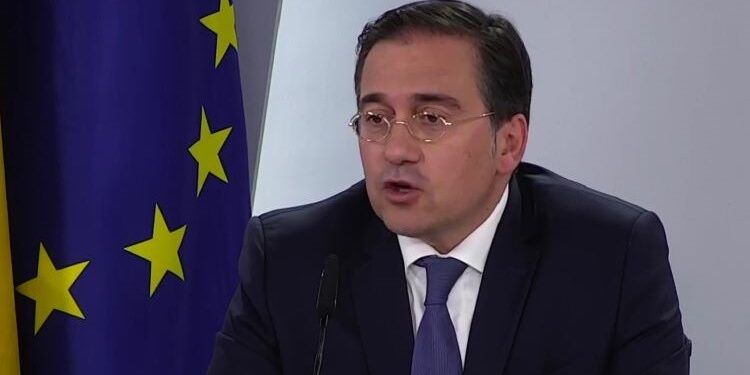Eduardo González
The Minister of Foreign Affairs, José Manuel Albares, came out yesterday against the accusations of “disloyalty” launched by the Government’s minority partner, Sumar, in relation to the security agreement with Ukraine, ensuring that he has been reporting on it for “months” to all parliamentary groups, including Sumar, and that, in all this time, no one has raised “any doubt, no question and no opposition in this regard.”
Albares made these statements during the press conference after the Council of Ministers, one day after the President of the Government, Pedro Sánchez, and the President of Ukraine, Volodimir Zelenski, signed the Security Cooperation Agreement between Spain in Madrid. and Ukraine, based on which our country undertakes to send Kyiv a military aid package valued at 1,129 million euros.
The agreement came about after the Council of Ministers approved on April 16 an extraordinary credit of, precisely, 1,129 million euros for the “supply of various materials to strengthen military capabilities,” without further details. The Council’s reference was limited to specifying that “the current international situation is immersed in a context of high volatility, uncertainty and instability, which is why it is necessary to urgently reinforce military capabilities in order to increase the available strategic reserve.”
For this reason, Sumar did not like Pedro Sánchez’s announcement at all. In statements to the media, Sumar’s spokesman (and Minister of Culture), Ernest Urtasun, criticized on Monday the “opacity” of the PSOE in relation to this agreement and regretted that, during the Council of Ministers in which the aforementioned agreement was approved allocation of 1,129 million euros for defense, it was not reported that its objective was the shipment of weapons to Ukraine. For her part, the second vice president of the Government and leader of Sumar, Yolanda Díaz, yesterday accused the PSOE of “disloyalty” for not providing her with all the information and demanded a debate in the Congress.
In response to these criticisms, Albares assured that he himself, “literally”, had been reporting on this agreement for “months” in the various parliamentary committees (Foreign Affairs Committee in Congress, Joint Commission for the European Union and, “the last one”, in the Senate Foreign Affairs Committee). “I don’t remember anyone raising any doubts, asking me any questions, or raising any objections about it, and yet now it seems that they are all doubts,” he declared. In addition, he warned that the agreement with Ukraine has the status of a memorandum of understanding and, therefore, it was not necessary to approve it in the Congress of Deputies, and recalled that Pedro Sánchez himself reported on the negotiations of this agreement during his last appearance before the Congress.
In any case, he continued, given the dramatic situation that Ukraine is experiencing, “everyone understands” that the country needs help “now” and that it cannot be “delayed even a single day”, which is why he called on “the common sense and the responsibility of all” before a people that “very bravely” faces a war “contrary to the Charter of the United Nations” and that is defending “its territorial integrity, its democracy and its freedom.” “I think it’s something we all have to support,” he concluded.
Robles informs the EU of the agreement
For her part, the Minister of Defense, Margarita Robles, reported yesterday in Brussels, during the meeting of Defense Ministers of the European Union, of the signing of the bilateral security agreement with Ukraine and announced the upcoming shipment of an important batch of aid. military, including ‘Leopard’ tanks, armor, howitzers, missiles and artillery ammunition.
Likewise, she assured that Spain will continue to “contribute to six coalitions of capabilities within the framework of the Contact Group (Armorships, Maritime Security, Artillery, Anti-Aircraft Defense, Information Technologies and Demining).” The meeting was convened by the High Representative for Foreign Affairs and Security Policy, Josep Borrell, and was attended by the Secretary General of NATO, Jens Stoltenberg, and the Minister of Defense of Ukraine, Rustem Umerov (the latter by videoconference).







